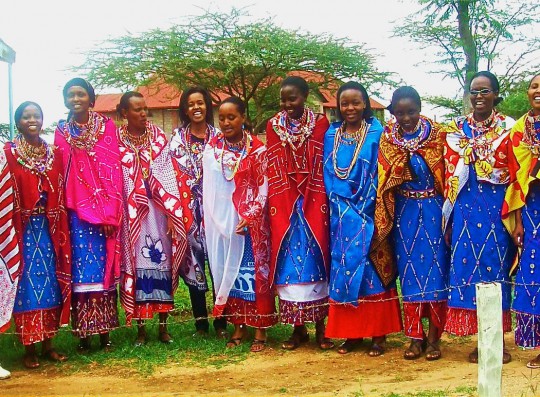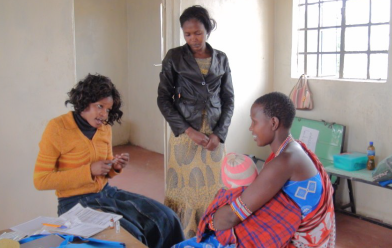University Scholarship
Sponsors one young Maasai woman for one month of university
Choose one or more projects you care about from our portfolio of projects around the world, make a donation and see the life-changing, even life-saving, impact of your giving!
Create your own uber-cool fundraising team to raise funds for (a) project(s) you care about, then invite your friends/colleagues/family to donate and change the world with you! Multiply the good and multiply your impact!
Offer a friend/colleague/loved one a unique, unforgettable gift with a W4 gift card! When you offer a W4 gift card, the recipient of your gift can choose a project to support from among our many girls' & women's empowerment projects around the world. The recipient of your gift card will receive updates throughout the year about the project, as well as W4 "goodies" relating to the project. So offer a W4 gift card today and spread joy & love!





 Shared by VOH graduate Faith Selian who runs a mobile health clinic:
Two months ago, Faith met 12-year-old Nosim from Torosei, Kajiado. She was 5 months pregnant, and appeared sick and anemic. It was her first visit to the antenatal clinic. As Faith was taking Nosim’s medical history, she asked how and why she got married so young. The young girl narrated her story: "I was forced to drop out of school a year ago, undergo female circumcision, and become the third wife of a 45 year old man. I was a good student, but I grew tired of being teased by the circumcised girls. Most of my classmates were circumcised and married at the age of 8 and 9.” Not a single girl from Nosim's village has completed primary school. Nosim also shared that, although she wishes she had been given a chance to complete school and become a teacher or a nurse, her greatest wish was to marry someone whom she loved. Nosim said that she does not love the "old man" she married and wishes she could have married the young warrior she loved.
Faith says that Nosim's story is common in every village that she visits: “I see how my life would have been if Voices of Hope did not give me a chance to become a nurse.”
Shared by VOH graduate Faith Selian who runs a mobile health clinic:
Two months ago, Faith met 12-year-old Nosim from Torosei, Kajiado. She was 5 months pregnant, and appeared sick and anemic. It was her first visit to the antenatal clinic. As Faith was taking Nosim’s medical history, she asked how and why she got married so young. The young girl narrated her story: "I was forced to drop out of school a year ago, undergo female circumcision, and become the third wife of a 45 year old man. I was a good student, but I grew tired of being teased by the circumcised girls. Most of my classmates were circumcised and married at the age of 8 and 9.” Not a single girl from Nosim's village has completed primary school. Nosim also shared that, although she wishes she had been given a chance to complete school and become a teacher or a nurse, her greatest wish was to marry someone whom she loved. Nosim said that she does not love the "old man" she married and wishes she could have married the young warrior she loved.
Faith says that Nosim's story is common in every village that she visits: “I see how my life would have been if Voices of Hope did not give me a chance to become a nurse.”
Female circumcision, also known as Female Genital Cutting (FGC), is common among the Maasai, a semi-nomadic people who reside in Kenya and northern Tanzania. Although the procedure is illegal in Kenya and only a small minority of Kenyans condones Female Genital Cutting, a recent UN estimate suggests that 27 percent of Kenyan women aged 15 to 49 have undergone some form of the practice. Within the Maasai community, however, it remains more common – in some communities every adult Maasai woman counted in a recent survey had undergone female circumcision.
W4’s field project Voices of Hope is offering young Maasai women living in Kenya’s Kajiado District a way out of female genital cutting through full university scholarships. The young women graduates of this program go on to become active change-makers and leaders in their communities and models for other young women.
Faith is one such woman. After completing university and becoming a registered nurse, Faith is now running a mobile health clinic that tours the Maasai plains. In addition to reaching women who would otherwise never receive medical attention, she is also becoming a role model for Maasai girls as an uncircumcised, educated Maasai woman. Most of the villages she visits have never seen a Maasai woman complete primary school. Faith also gives seminars to both men and women about health issues including HIV/AIDS, nutrition, and the effects of FGM and underage childbirth, as well as about the importance of girls’ education.
By funding a young Maasai woman’s university scholarship, you can help ensure that she has the chance to establish a sustainable livelihood and become a change maker like Faith. Educated, independent and respected by her peers and elders, she can lead the way in transforming mindsets from within Maasai society and eradicate the harmful practice of female circumcision.
Harness the power of education to help a young Maasai woman escape female genital cutting!
Sponsors one young Maasai woman for one month of university
Sponsors two young Maasai women for one month of university
Sponsors one young Maasai woman for one year of university
Support us by sharing
and raising awareness!


Thank you for having me this summer! I look forward to continuing our relationship.

From Portland, OR group
Second donation from Portland OR group
From a group of women in Portland, Oregon




FGM must end!
In order to submit your project to our team, you have to save it first
In order to translate your project, you have to save it first
To proceed, please tick the ?Translation Available? box on the upper right hand side of your project drafting page.
You are about to submit your translation. After submission, you will not be able to include further edits to your translation until it has been approved by our team.
You cannot add more than 6 projects to a team
The project(s) cannot be deleted from the team(s) because donations have already been made to the project(s) in the team fundraiser.
Create an account to create and join teams
Create an account to create and join teams
Sign In 


Invalid login information
Too many failed login attempts.
Your account has been locked.
Please try again in 15 minutes.
Too many failed login attempts.
Your account has been locked.
Please try again in 15 minutes
|
You do not have an account yet? Create an account |
Create your account 



Please click the checkbox
Please read and accept the General Terms of Use
|
Already registered? Log in |